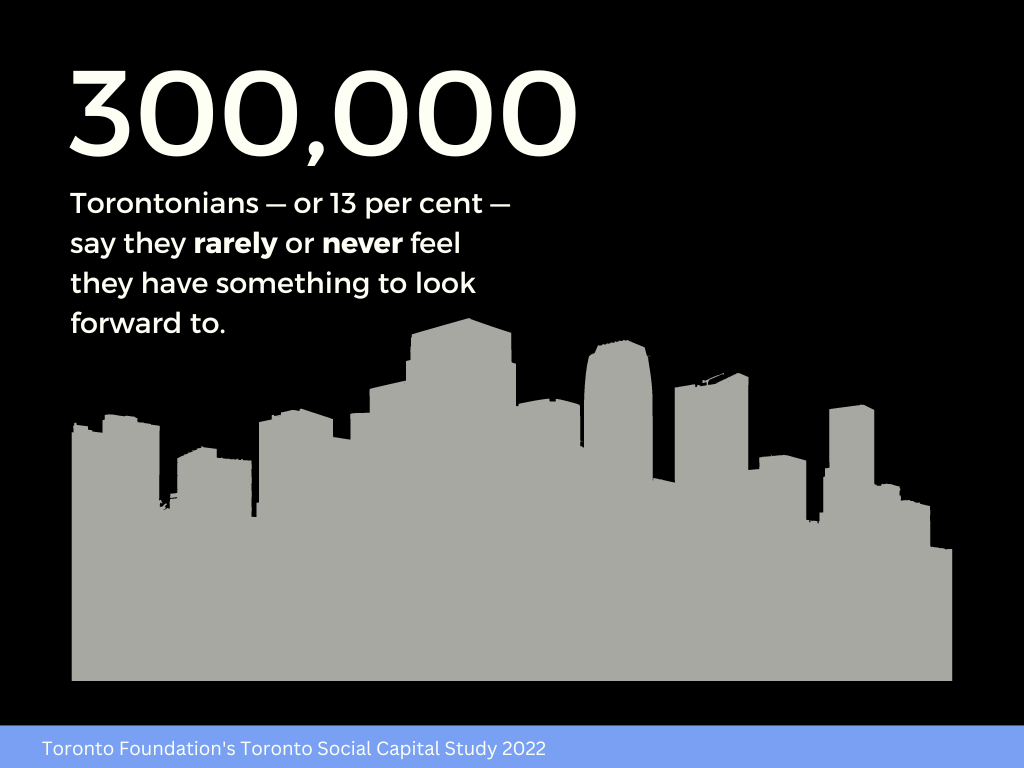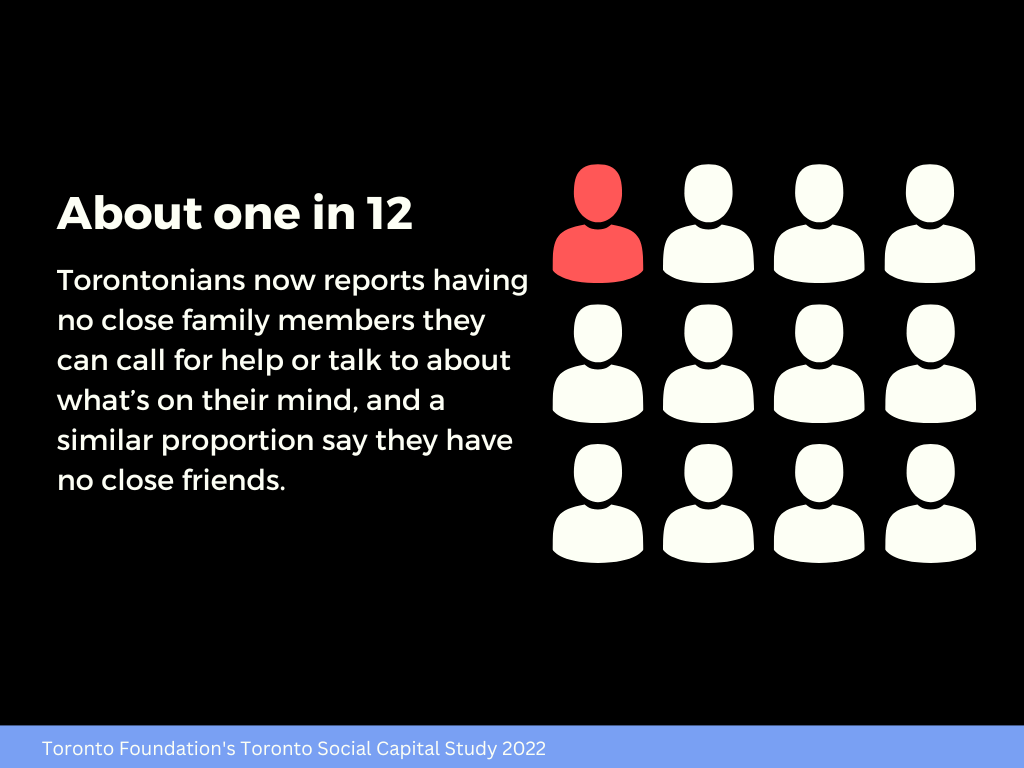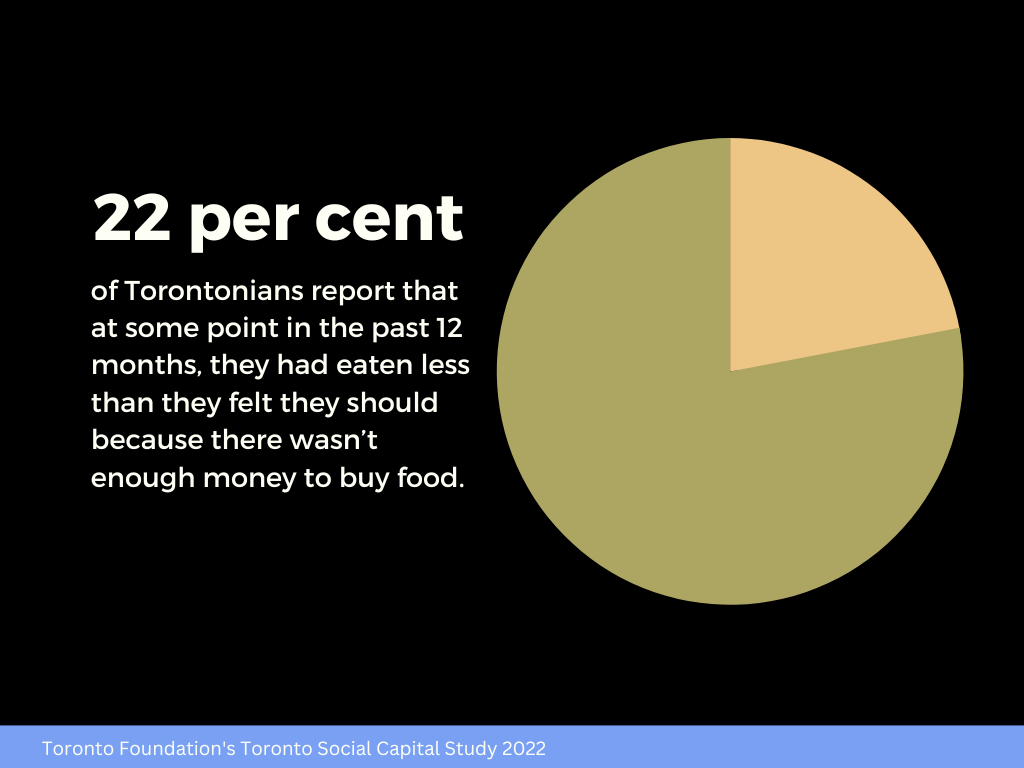One in 12 Torontonians have no close family or friends post-pandemic — how can they rebuild a sense of community?
Why It Matters
Community services organizations can play a major role in helping Toronto’s population regain their sense of social connectedness. But the decline in community engagement poses a huge barrier to recovery from the social impacts of the pandemic.
|
Getting your Trinity Audio player ready...
|
This independent journalism is made possible by the Future of Good editorial fellowship on community resilience, supported by Co-operators. See our editorial ethics and standards here.
Toronto’s communities are fragmented.
The physical and social isolation caused by the pandemic has driven a wedge in the city’s sense of connectedness, community, and social cohesion. A recent study on Toronto’s social capital by the Toronto Foundation compares findings from a similar study done in 2018 to understand the impact of the pandemic on the city’s population.
The first study done in 2018 asked questions such as: ‘do Torontonians feel connected to each other? Do they trust their neighbours? Are they engaged with community organizations and initiatives?’ And the findings were generally positive, reporting that most Torontonians surveyed in 2018 did feel a sense of trust and connectedness.
However, the 2022 study that surveyed more than 4,000 Torontonians shows a stark decline in many areas of social connection. People have reported having fewer close family members and friends, a decrease in life satisfaction, and being less involved in their community.

More than 300,000 people, or 13 per cent of Torontonians, say they rarely or never feel they have something to look forward to. And while these declines were true for all residents, Torontorians who experience frequent discrimination have lower life satisfaction, poorer mental health and greater economic insecurity.
“The pandemic’s impact is undoubtable, but, overall, social capital in Toronto continues to constitute a tremendous resource that can be tapped to help the city emerge stronger, healthier and more vibrant than ever,” states the reports.
So what is social capital?
Social capital is the strength of a person’s social networks, relationships, and connections. It also refers to the trust a person has in their community and whether they feel like they can rely on someone — whether that’s a friend, family member, or neighbour.
“It is a key ingredient in making communities productive, healthy, inclusive and safe. Social capital can be seen as a resource that communities can draw upon to respond to crises; at the same time, it is a resource that can be depleted, leaving communities less well-positioned to face what comes next,” according to the social capital report.
Social capital for Torontonians has declined since 2018 and impacted people from all backgrounds. However, those with lower income and youth are particularly more vulnerable. It’s also notable that Black Torontonians have faced a significant drop in social trust, and a decline in community participation. Those with disabilities face greater economic insecurity than the average and have less access to support from family and friends.
Social networks are shrinking for Torontonians
The pandemic obviously changed the way we socialize with each other, but more than that, the Toronto Foundation report shows that it greatly damaged Toronto’s social networks.
About one in 12 Torontonians now reports having no close family members they can call for help or talk to about what’s on their mind, and a similar proportion say they have no close friends. That’s more than 200,000 people in the city who lack this form of social support.

Those who are less connected in these ways include those who have lower incomes, unemployed people, people with a disability, and those with poor mental health.
Also, many people reported seeing their friends and family less in person than in 2018. Most people are seeing their friends six per cent less, while 2SLGBTQ+ and Black Torontonians are seeing their friends 12 per cent less, and seniors reported seeing their friends 14 per cent less.
The report states that messaging apps or video calls, while great for staying in touch with people, are an addition and not an alternative to in-person meetings. And those who see their friends and family in person are actually more likely to communicate regularly online as well.
“Many Torontonians have lost touch with their support networks in the pandemic, which make any emerging challenges more severe,” according to the report. “Many community leaders see the impacts in their work, saying that community members are increasingly turning to nonprofits for support when experiencing mental health challenges or when they can’t make ends meet.”
Community engagement and volunteerism has dropped, but social service demand is higher than ever
During a time when Torontonians feel disconnected from their usual support systems, “community organizations played key roles in organizing neighbourhood support, particularly around food security and wellness checks,” says the report.
However, Volunteer Toronto stated earlier this year that the number of volunteers has dropped. Similarly the Toronto Foundation’s report found that civic engagement has seen a significant decline including people’s involvement in community groups, and donations.
The percentage of Torontonians donating to charities dropped by 12 per cent, which represents a loss of 300,000 donors in the city, and about $180 million in donations in the last year. Volunteering has also seen a decline from 2018 by 12 per cent, which is a loss of 36 millions volunteer hours.
“Our research underlines how community organizations are the backbone of a healthy society,” states Sharon Avery, president and CEO of the Toronto Foundation. “We learned that there is a strong correlation between involvement in groups like charities, arts, sports and faith-based organizations and high levels of social capital overall. As well, we learned that this kind of engagement is also a key factor in overall health and wellbeing.”
Community organizations can play an instrumental role for Toronto’s recovery in terms of social capital, however, they are struggling to meet the community’s needs with their resources stretched thin.
Life satisfaction and wellbeing for Torontonians has dropped
The Toronto Foundation study also found that wellbeing in Toronto declined significantly between 2018 and 2022: Torontonians reported low life satisfaction, and were less likely to report good physical or mental health. Life satisfaction was reporter lower for 2SLGBTQ+ respondents compared to those who are heterosexual — and also lower for people with disabilities than those without.

Food insecurity is a major factor in Torontonians’ well-being. About one in five (or 22 per cent) report that at some point in the past 12 months, they had eaten less than they felt they should because there wasn’t enough money to buy food.
So what do Torontonians need in order to recover their social capital?
Strong social capital is vital for communities — people trust each other, feel they can rely on each other for support, and lean on this network in times of crisis.
